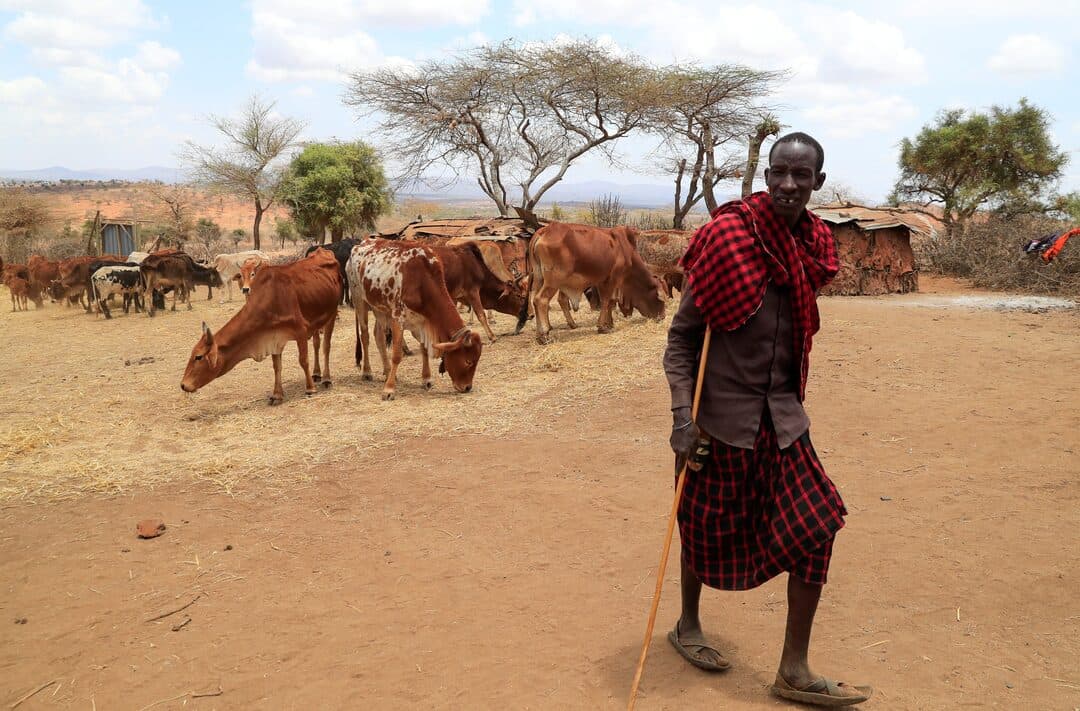We're loading the full news article for you. This includes the article content, images, author information, and related articles.
A severe drought in Kajiado County is driving pastoralists on desperate journeys for pasture, leading to a sharp increase in livestock and meat prices that will hit Nairobi consumers hard this festive season.

A deepening drought across Kajiado County has decimated pastures, forcing pastoralist communities into a desperate exodus in search of grazing land and water for their animals. Vast areas of Kajiado East, Central, South, and West sub-counties now lie bare, replaced by cracked earth and the inedible Ipomea weed, a grim indicator of failed rains. This environmental crisis is compelling herders, like Raphael Teishi from Oloirien village, to undertake arduous treks of 50 kilometers or more to neighboring counties like Machakos, a strategy fraught with risk but seen as the only hope to save their herds from starvation. The migration is a direct consequence of forecasts by the Kenya Meteorological Department (KMD), which in September 2025 warned of below-average rainfall for the remainder of the year, a prediction now materializing with devastating effect.
The mass movement of livestock and the resulting scarcity in local markets have triggered a sharp spike in meat prices, with significant implications for consumers in Nairobi and surrounding satellite towns. A spot check at major livestock markets such as Ilbisil, Sultan Hamud, and Sompole revealed a low supply of animals, which has inflated prices dramatically. The wholesale price of beef in Kajiado has jumped to between Sh480 and Sh540 per kilogram, a steep rise from the Sh410-Sh420 range seen just three months prior. In Kitengela, a major urban center, wholesale beef now costs Sh530 per kilogram, translating to retail prices of up to Sh700 in butcheries. High-end establishments are selling a cooked kilogram of beef for as much as Sh1,000 to Sh1,300. James ole Nkapapa, chairman of the Ilbisil slaughterhouse, warned on November 15, 2025, that prices are expected to climb even higher if the drought conditions persist, signaling an expensive Christmas season for Kenyan families.
This is not an isolated event but part of a worsening cycle of climate change-induced disasters affecting pastoralist livelihoods across Kenya's Arid and Semi-Arid Lands (ASALs). Between 2020 and 2023, Kenya experienced the most severe drought in four decades, with five consecutive failed rainy seasons that killed over 2.5 million livestock animals and devastated the pastoral economy. The National Drought Management Authority (NDMA) reported that the 2020-2022 drought in Kajiado alone led to the deaths of over one million animals. These recurrent and intensifying droughts undermine the traditional mobility of pastoralists, forcing them to travel further and for longer periods, which in turn increases the risk of resource-based conflicts with host communities.
The economic impact extends far beyond individual households. Kajiado County's livestock sector boasts an annual turnover of Sh3.2 billion, an economic engine now under severe threat. For pastoralist families, livestock represents their entire wealth, social status, and cultural identity. The loss of animals due to drought plunges them into deep poverty, disrupts family structures, and can lead to increased school dropouts as children are pulled into herding duties. The current crisis sees healthy, fattened bulls fetching premium prices of Sh150,000 to Sh180,000, while the value of emaciated animals has plummeted, leaving herders with dwindling assets and little bargaining power. This situation creates a vicious cycle of poverty and vulnerability, making it harder for communities to recover from each successive climate shock.
In response to the escalating crisis, government agencies and non-governmental organizations are mobilizing. The State Department for Arid and Semi-Arid Lands has promised interventions to protect vulnerable people and animals. Principal Secretary Harsma Kello confirmed to Climate Action that the government is moving to mitigate the effects of the prolonged dry spells. Local authorities, including the Kajiado County Commissioner, have advised herders to strategically sell off parts of their herds now to avoid catastrophic losses later. However, long-term solutions require a fundamental shift from reactive emergency aid to proactive resilience-building. This includes investing in sustainable water harvesting systems, promoting drought-tolerant fodder production, expanding access to livestock insurance, and strengthening early warning systems to better prepare communities for the inevitable impacts of climate change.
Keep the conversation in one place—threads here stay linked to the story and in the forums.
Sign in to start a discussion
Start a conversation about this story and keep it linked here.
Other hot threads
E-sports and Gaming Community in Kenya
Active 9 months ago
The Role of Technology in Modern Agriculture (AgriTech)
Active 9 months ago
Popular Recreational Activities Across Counties
Active 9 months ago
Investing in Youth Sports Development Programs
Active 9 months ago